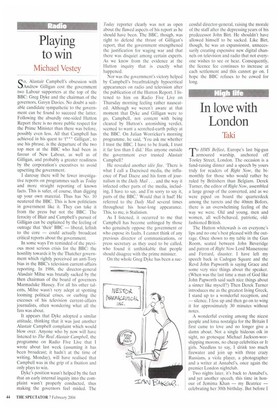Playing to win
Michael Vestey
So,Alastair Campbell's obsession with Andrew Gilligan cost the government two Labour supporters at the top of the BBC: Greg Dyke and the chairman of the governors, Gavyn Davies, No doubt a suitable candidate sympathetic to the government can be found to succeed the latter. Following the absurdly one-sided Hutton Report there is no more public respect for the Prime Minister than there was before, possibly even less, All that Campbell has achieved in his quest to f*** Gilligan', to use his phrase, is the departure of the two top men at the BBC who had been in favour of New Labour, as well as of Gilligan, and probably a greater readiness by the corporation's executives to avoid upsetting the government.
I daresay there will be fewer investigative reports on programmes such as Today and more straight reporting of known facts. This is safer, of course, than digging up your own material. Thus has No. 10 neutered the BBC. This is how politicians in government like it. They can take it from the press but not the BBC. The ferocity of Blair and Campbell's pursuit of Gilligan can be explained by the feeling of outrage that 'their' BBC — liberal, leftish to the core — could actually broadcast critical reports about the government.
In some ways Fin reminded of the previous most serious crisis for the BBC: the hostility towards it by the Thatcher government which rightly perceived an anti-Tory bias in the BBC's television current-affairs reporting. In 1986, the director-general Alasdair Milne was brutally sacked by the then chairman of the board of governors Marmaduke Hussey. For all his other talents, Milne wasn't very adept at spotting looming political crises, or curbing the excesses of his television current-affairs journalists, often wondering what all the fuss was about.
It appears that Dyke adopted a similar attitude, thinking that it was just another Alastair Campbell complaint which would blow over. Anyone who by now will have listened to The Real Alastair Campbell, the programme on Radio Five Live that I wrote about last week (assuming it has been broadcast; it hadn't at the time of writing, Monday), will have realised that Campbell was in the grip of a fixation and only plays to win.
Dyke's position wasn't helped by the fact that an early internal inquiry into the complaint wasn't properly conducted, thus making the governors feel misled. The Today reporter clearly was not as open about the flawed aspects of his report as he should have been. The BBC, though, was right to defend the thrust of Gilligan's report, that the government strengthened the justification for waging war and that there was disquiet among certain experts. As we know from the evidence at the Hutton inquiry that is exactly what happened.
Nor was the government's victory helped by Campbell's breathtakingly hypocritical appearances on radio and television after the publication of the Hutton Report. I listened to him on Radio Five Live on Thursday morning feeling rather nauseated. Although we weren't aware at that moment that Dyke and Gilligan were to go, Campbell, not content with being cleared by Hutton's astonishing verdict, seemed to want a scorched-earth policy at the BBC. On Julian Worricker's morning programme. he said, 'You ask me whether I trust the BBC. I have to be frank, I trust it far less than I did.' Has anyone outside the government ever trusted Alastair Campbell?
He revealed another idee fae. 'There is what I call a Dacreised media, the influence of Paul Dacre and his form of journalism in the Daily Mail. . and the way it infected other parts of the media, including, I have to say, and I'm sorry to say it, parts of the BBC.' Would that it had He referred to the Daily Mail several times throughout his hour-long appearance. This, to me, is Stalinism.
As I listened, it occurred to me that Campbell has become unhinged by those who genuinely oppose the government or who expose its faults. I cannot think of any previous director of communications, or press secretary as they used to be called, who found it unthinkable that people should disagree with the prime minister.
On the whole Greg Dyke has been a suc
cessful director-general, raising the morale of the staff after the depressing years of his predecessor John Birt. He shouldn't have allowed himself to be sacked. Like Birt, though, he was an expansionist, unnecessarily creating expensive new digital channels on television and radio that not everyone wishes to see or hear. Consequently, the licence fee continues to increase at each settlement and this cannot go on I hope the BBC refuses to be cowed for long.


























































 Previous page
Previous page